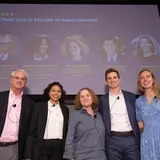
Clarifying Misconceptions: Insights from the 2023 Yale Impact Investing Conference
Feli Oikonomopoulou ’24 reflects on what impact investing does and does not mean.
Impact investing has evolved from a niche market into a growing global movement with measurable outcomes. The 2023 Yale Impact Investing Conference highlighted this by bringing together individuals with exceptional contributions in their fields committed to creating positive change in the world. It was an opportunity to discuss the challenges and opportunities of impact investing, to learn from successful impact investors, and to explore new investment strategies. Perhaps most importantly, the conference helped clarify some common misconceptions about impact investing. Here are some of the points the conference helped to drive home:
- Impact investing does not mean sacrificing financial returns for impact. In fact, the practice of investment is changing, and more than $23 trillion assets globally are invested in impact-driven purposes, recognizing their longer-term financial potential. The largest asset managers are establishing impact investment practices, while CEOs, such as Larry Fink of Blackrock, acknowledge that “to prosper over time, every company must not only deliver financial performance but also show how it makes a positive contribution to society.”
- Impact investing is not only about environmental, social, and corporate governance (ESG) standards. While ESG is a critical consideration, impact investing is more than a way of risk mitigation or minimizing negative effects. It is about actively seeking out opportunities to create social value while generating financial returns. This involves investing in companies, organizations, or funds that have a clear and measurable social or environmental mission (such as renewable energy, affordable housing, education, healthcare, and more) that fits within their broader reason for existence.
- Creating meaningful impact takes time. While there is growing excitement around impact investing, the uncomfortable and less spoken truth is that creating meaningful impact does not happen overnight. There are ambitious commitments to reduce emissions and promote decarbonization by 2030, and it will take sustained effort and collaboration from individuals, organizations, and policymakers to achieve these goals. Social entrepreneurs are still facing significant challenges in convincing venture capital firms about the potential of their missions to generate returns, and the road ahead is not easy. Despite the progress made in recent years, there is still a long way to go.



At its core, the conference served as a powerful reminder that impact investing is not simply about highlighting a series of success stories, but about transforming the narrative of the value that businesses can bring to our societies and the mission that we want our capital to serve.



